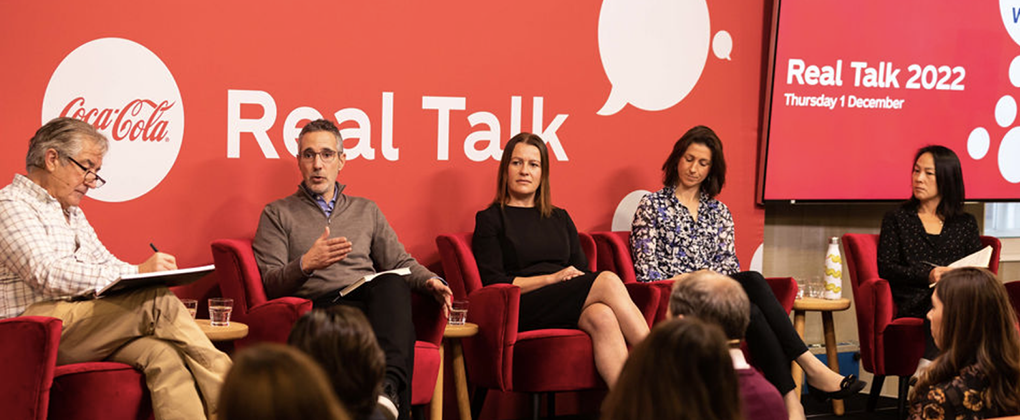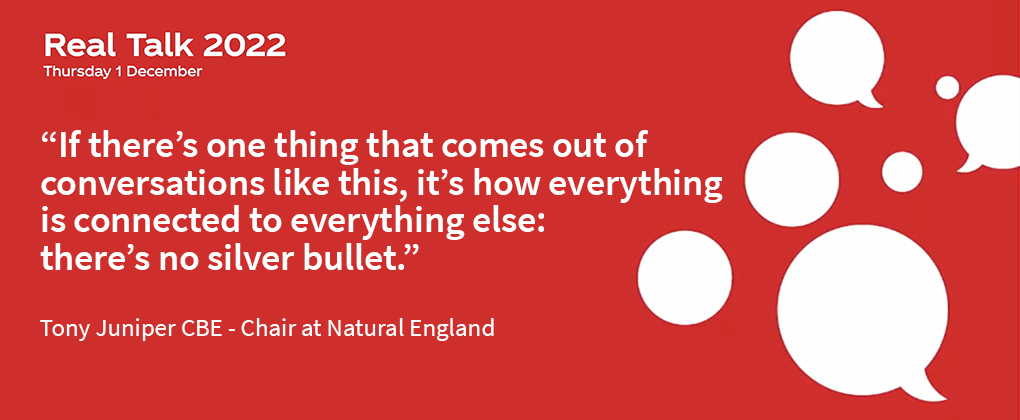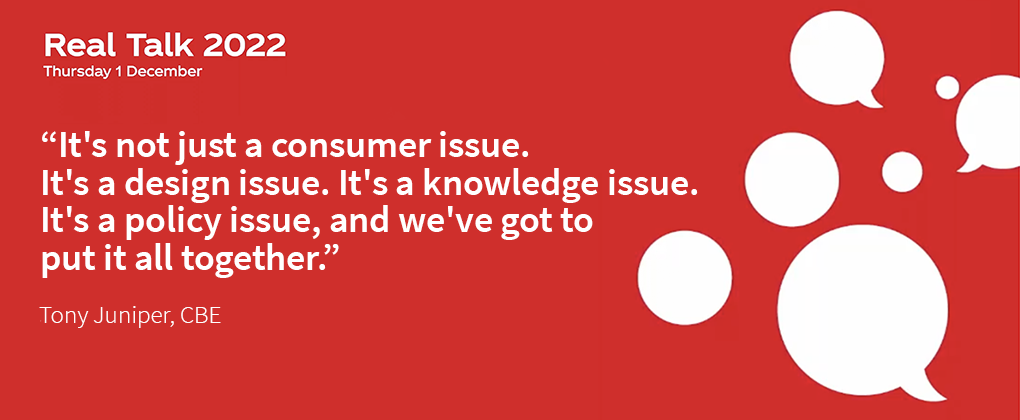
HOW COCA‑COLA’S REAL TALK FORUM IS DRIVING COLLABORATION TO TACKLE THE BIG ISSUES
Read on, as we reveal what went down at the 2022 Real Talk forum, brought to you by Coca‑Cola GB, this year in partnership with WRAP.
The 2022 edition of Coca‑Cola’s annual Real Talk forum kicked off in early December, with high-profile speakers from Coca‑Cola, McDonald’s, WRAP, WWF, M&S and Behaviour Change coming together to discuss packaging and the future of the industry. Topics included reuse and refill, the challenges facing businesses, governments and consumers, and what more can be done to move quicker towards a circular economy.
The debate was chaired by Tony Juniper CBE, a lifelong sustainability campaigner. Juniper was joined by Coca‑Cola’s Joe Franses, Vice-President Sustainability, CCEP; Catherine David, Director of Collaboration and Change, WRAP; Paula Chin, Senior Policy Advisor, WWF UK; Nina Prichard, Head of Sustainable and Ethical Sourcing, McDonalds; Lucinda Langton, Head of Sustainability, M&S Food, and David Hall, Founder and Executive Director, Behaviour Change.
The discussion opened with Juniper talking about the increasing public focus on the environment, climate change, and plastics.
“There were consumer campaigns to go zero plastic, and major pressure put into the system,” Juniper explained. “Should we go for deposit return schemes? Should we have a plastic tax? Should we phase out certain kinds of packaging? We’ve also seen a lot of innovation on the technical side, too.”
Coca‑Cola Europacific Partners’ Joe Franses explained that we face huge challenges when it comes to the environment, plastics and plastic waste. “From a Coca‑Cola perspective, we’re certainly part of the challenge” Franses admitted. “But we’re also hopefully a part of the solution.
“If you think about what we’ve done over the past five years. We’ve invested significantly as a business to shift away from using oil-based virgin plastic, for example. Ten years ago we were one of the first businesses to put a marker in the sand to think about how we shift from virgin plastics to recycled plastic. Today, in every single one of our 500ml bottles in Great Britain, all of the plastic is 100% recycled .
“The other thing we’ve really changed over the past five years is that we’re really strongly advocating for well-designed deposit return schemes (DRS), because quite frankly, we know that such schemes provide the best option for getting plastic bottles back out there.”

A shared message across multiple industries
McDonald’s Nina Prichard was the next panellist to join the discussion, highlighting issues and challenges that resonate across multiple industries.
“From a McDonald’s UK and Ireland perspective, we have two clear priorities,” Prichard explained. “Thinking about the start of life, we need to ensure we responsibly source our packaging. By 2024 we intend to ensure that all our packaging is either renewable, recycled or certified. We also need to think about the end of life to ensure all the waste in our restaurants can either be recycled or composted.”
We have made good progress; however, we recognise there is always more to do, it is about continuous improvement,” Prichard added. “And I think we will talk more about the importance of collaboration as the conversation progresses.”
M&S Food’s Lucinda Langton joined the debate after Prichard, highlighting the fact that M&S has a long history when it comes to sustainability, stretching back to 2007, but with a reinvigorated focus on packaging over the past year.
“M&S is looking to remove a billion units of plastics from the ecosystem,” said Langton, “which is around 30% of the plastic that we put on the market, by 2027. That’s been a major programme of re-evaluation of almost every SKU (product), how we protect the shelf life of food, and stop food waste effectively?”
As with Coca‑Cola Great Britain, Langton explained that M&S is also driving for 100% recyclability for all its packaging, focusing on plastics in 2022, with the aim of achieving its target by 2025.
While all the panellists highlighted the significant efforts each company has made over the past few years, each were quick to acknowledge the challenges ahead, and the need for collaboration and a holistic approach to meet ambitious sustainability targets.
WWF’s Paula Chin highlighted the fact that there have also been delays when it comes to implementing widespread change and called for this to stop. “Ultimately, the big overarching crisis that we’re all facing is a climate crisis,” Chin emphasised.
Chin went on to point out the importance of acting sooner than later, rather than “simply moving chess pieces around the room”. That means looking outside of simple considerations of material use and recycling and looking at ways we can reduce waste across the entire ecosystem. “We’ve got to think about this holistically, and we’ve got to think about it from a systems change point of view,” Chin added.
How consumers can play a part
Big business is obviously hugely influential when it comes to food waste, packaging and recycling, but consumers also have a critical role to play. With that firmly in mind, following a passionate and insightful debate between the group, the discussion moved over to our consumer panellists, WRAP’s Catherine David and Behaviour Change’s David Hall.
WRAP’s Catherine David was first to the table, highlighting the fact that changes from businesses can also help to instigate changes to consumer behaviour, using apples as an interesting example.
“We published some research earlier this year that showed with the majority of fresh fruit and veg in the fresh produce aisle, if you take away the plastic packaging, you also reduce food waste,” David explained.
“There are two main reasons. One is that people often buy more than they need. You may want to go and buy two apples, but the only option is six apples. The other reason is that plastic packaging often carries a best before date, and so people look at that and throw it in the bin. In the research, we found that people were holding onto apples for up to three months longer when they weren’t packaged.”
David Hall followed, talking about the challenges that consumers face when it comes to recycling, with confusion a large potential stumbling block. “I think people are still confused about some items, and they don’t necessarily know whether they’re recycled or not, and I think we do need people to understand what they can do. We really need to think holistically about the levers we can pull to change peoples’ behaviour.

Where we go from here
“I think from a behaviour change point of view, we really need to focus on making it easy for people to do the right things,” Hall added. “Attaching a lid to a bottle so you definitely know whether it can be recycled is absolutely making life easier. Putting a recycle logo on a bread bag that isn’t recyclable at home probably isn’t making it easier. It’s often confusing people and making things more complicated.
“The question is,” Juniper asked, “is how we get to scale, and how we actually start to wrap this stuff into things that are going to start to shift the entire system… Who is in a pole position to go from pilots and trials into scale?”
“WRAP’s UK Plastics Pact is the place where we can convene on these issues,” David added, “but I’m quite carefully saying that I think this isn’t an either or, this isn’t ‘which horse do you back’, this is where we need to back all horses together, ideally in a way which minimises duplication.
“If there’s one thing that comes out of conversations like this,” added Juniper, “it’s how everything is connected to everything else: there’s no silver bullet. You’ve got to take a systems-level view because all these things are connected, but in terms of the environmental consequences, because it’s not only a carbon issue, it’s a pollution of the oceans issue, and therefore a wildlife issue.
“It's not just a consumer issue. It's a design issue. It's a knowledge issue. It's a policy issue, and we've got to put it all together.”
It’s clear from the discussion that there was a consensus view that DRS systems can play a large part in the future of packaging, and Franses highlighted the fact we’ll be seeing big changes across the UK over the next year, with Scotland, England and Wales all looking to implement their own DRS schemes.
Closing thoughts
The 90 minute discussion saw all panellists offer some fascinating insights into the challenges and potential solutions that we’re likely to see over the coming months and years.
Perhaps one of the most notable themes to come out of the discussion was the need to make things easier for consumers. “When we get into the detail, the context of cost-of-living pressures that people are under, how do we make it easier,” Juniper asked. “If that’s deposit return schemes, how do we use the collective infrastructure with all brands to work together to make it easier for the consumer? I think collaboration is key.”
It’s a sentiment all agreed with, with Chin calling for consumers, workers and politicians to rise above competition and work together to fight the challenges we’re facing.
As Franses very succinctly summed up, “we’ve really got to go faster, we’ve got to accelerate, we’ve got to do more, because otherwise we’re not going to be able to deliver the kind of system changes required.”
Want to watch the debate in full, and find out more about the sustainability efforts of all our panellists? Check out the video here.
